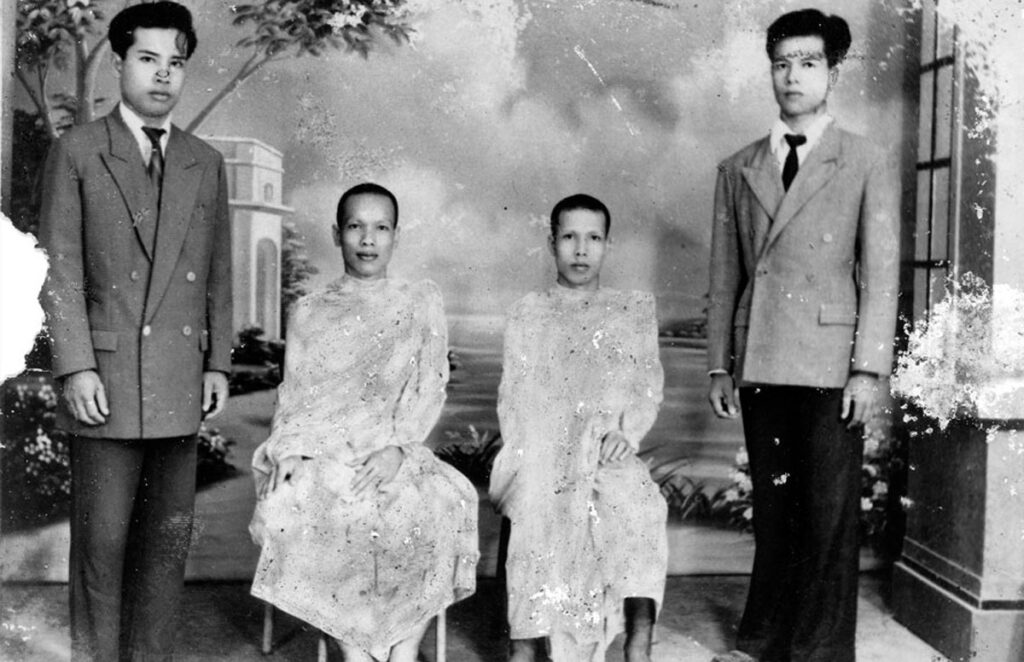My father died of old age before the Lon Nol regime took control of Cambodia, so my mother sold mats to support our family. But it wasn’t enough, so two of my brothers went to live at a pagoda where they became monks. When I was five years old, I began living with them at the pagoda.
I was a very good student, and was always first or second in my class. After completing school in Kandal Province, I moved to Phnom Penh to study at the School of Pedagogy. Keng Vann Sakk was its general director and Son Sen was its academic director. Son Sen was Chinese-Cambodian; he was very handsome and polite. After I graduated I became the principal of a school in Kampong Cham Province. Because the school was short of teachers, I also taught many classes.
In 1962 I married my cousin Pol Yem. From 1967 until 1972 I taught at a primary school. My principal propagandized for the Khmer Rouge, but I didn’t become involved in the movement.
When the bombing began, my wife and I decided to move; we became security guards at a district office near Phnom Penh. When the situation had not improved by 1974, we moved to a suburb of Phnom Penh and I returned to teaching.
In 1975 when the Lon Nol regime was defeated, we were evacuated to my home village in Kandal Province. Everyone there knew I used to be a teacher. When the cooperative chief asked me about my profession, I answered honestly, but did not say that I had been a guard. If they had found out that I used carry a gun, I would have been killed. I also told him that I knew how to fish, so he assigned me to work in a three-man fishing unit.
We lived with base people, but they didn’t approve of me because I was an April 17 person. However, I knew how to do many kinds of work, including transplanting rice, fishing, mending nets, sewing, giving injections and playing the tro [a traditional stringed instrument]. Because I worked very hard, they started to like me.
Every night the cooperative chief called me to play the tro with others in a band. We usually played “Male and Female Veterans Building Railways.” They played that song constantly on loudspeakers during dinner, so I learned to play it on my tro. Every time I played, the militiamen gave me tobacco.
My wife was assigned to grow rice in the cooperative. Her work was difficult and she didn’t have enough food. Sometimes I sometimes took the fish I caught and smoked them for her. I could not eat the fish I caught; if the Angkar found out, I would have been killed.
Once when I was fishing, I heard people screaming and falling into water. Lun, who fished with me, said he sometimes saw bodies in the water. Once he tried to bring up his fishing net, but it was so heavy that he couldn’t lift it, and saw that it was full of corpses. The bodies were tied with rope made from palm leaves.
Militiamen took people away to be killed every night. I never slept well because I felt frightened and didn’t know whose turn it was. The Angkar wanted to take me to be reeducated, but fortunately the villagers begged the cadres not to take me because I never argued with anyone.
In 1979 when the Vietnamese liberated us, the Khmer Rouge cadres forced me to ferry them across the river in my fishing boat: they were on the run. I wasn’t brave enough to refuse because they were armed. Although I brought an axe with me, none of them tried to harm me.
During the Khmer Rouge regime, I hid these photos in a rice sack. The cadres checked all of our belongings once, but didn’t see them. This picture of my wife was taken when she was a student. She survived the regime and died of natural causes after 1979; she was 50 years old. We had eight children, only five are alive today. One of my daughters died in a fire when a kerosene lamp that my wife had lit spilled.
My brothers and I took this photo for remembrance. The one on the left was Chey Phorn; he had been a soldier and later was on the medical staff at a hospital in Phnom Penh. He was evacuated to Battambang, where he and his family died of starvation. Chey S’boang was next; he was a layman at Sovatei Pagoda and died after the regime. Chey Phann became a monk when he was 12 or 13. He disappeared in 1975 when he was evacuated to Battambang. My sister Chey Siphann also died in the same way.

